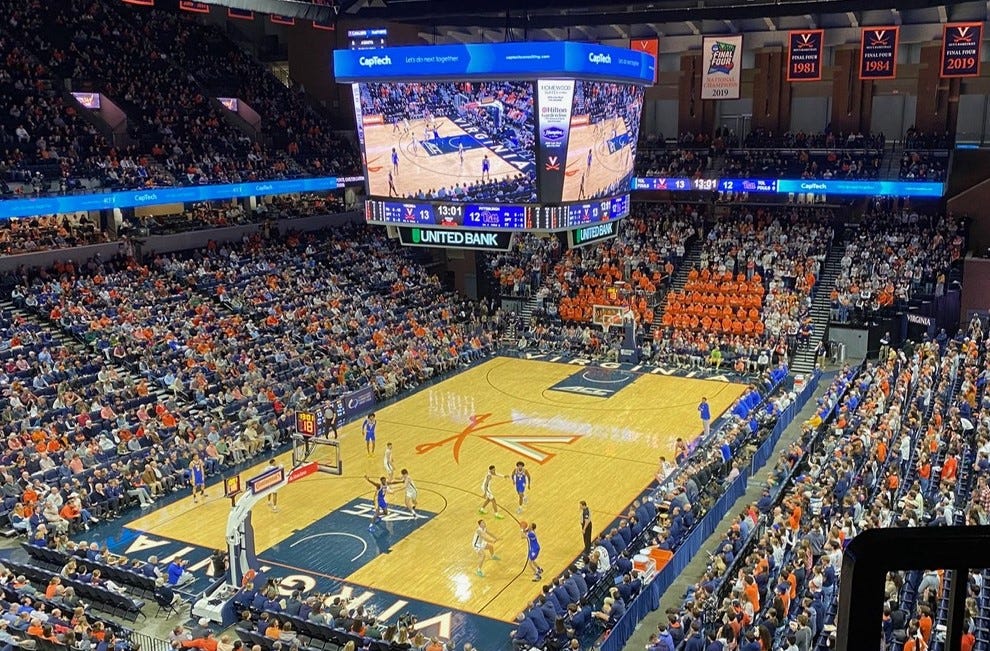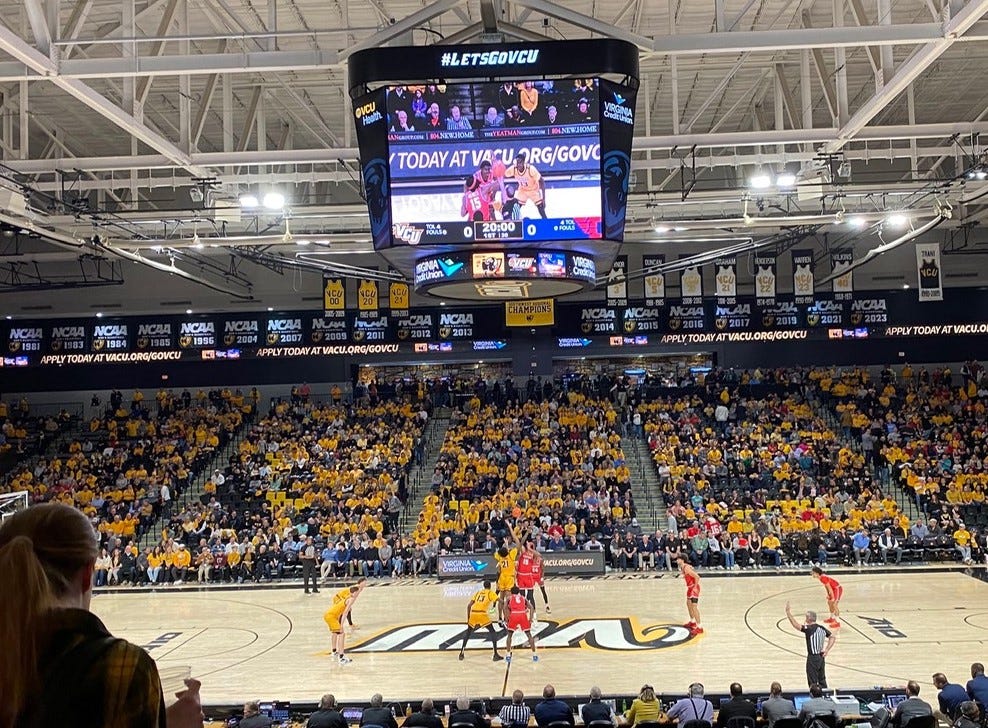During this General Assembly session, Virginia enacted a law that expands the legality of university support for student-athletes' name, image, and likeness (“NIL”) opportunities and prohibits the NCAA from acting against these new opportunities.
You could argue that Virginia is the most progressive state in the country in terms of NIL rights for college student-athletes. In addition to the new law, the Virginia Attorney General succeeded in federal court in a joint effort with the Tennessee Attorney General in getting a preliminary injunction against enforcement of rules prohibiting college sports collectives from using NIL to entice athletes to attend their universities. A collective is a booster organization related to a specific university that pays NIL to that school's student-athletes and arranges for NIL opportunities with businesses.
What will this mean for the college sports business in Virginia, especially for the football fortunes at U.Va. and Virginia Tech, which will greatly impact the Virginia economy?
College Sports Is Big Business in Virginia.
According to the Knight-Newhouse College Athletics Database, in 2023, the U.Va. athletics department received $140.94 million in revenue, of which $16.15 million came from student fees, which are a special charge on top of tuition. Its athletics department spent $138.23 million, of which $31 million was on football.
Virginia Tech received $129.52 million, of which $13.59 million was student fees. Virginia Tech’s 2023 spending data is unavailable, but in 2022, its athletics department spent $116.95 million, of which $41.8 million was on football.
I couldn’t find a trustworthy estimate of the total financial impact of these two athletics departments on Virginia’s economy, but it certainly is big. Consider hotel stays, restaurant meals, gas sales, airfare, car rental, parking, convenience store purchases, stadium concessions, sports bar revenue, tailgating food and supplies, and fan merchandise sales these teams generate.
Then, consider that Virginia also has Football Bowl Subdivision (FBS) football teams at Liberty University, JMU, and ODU. It also has Division I basketball programs at schools that don’t play FBS football, such as VCU, the University of Richmond, William & Mary, Hampton, Norfolk State, George Mason, Radford, Longwood, and VMI.
The total impact of college sports on Virginia’s economy must easily exceed $1 billion per year.
The New Virginia NIL Law
The new Virginia law is vague in places. For example, for some NIL activities, it doesn’t expressly state that a Virginia university may do something; it just prohibits the NCAA from punishing doing that thing, which implies that the activity is legal.
Here’s how I interpret the important parts:
It allows universities to pay student-athletes directly for using their NIL.
It also allows universities, their athletic foundations, and collectives to identify, create, negotiate, facilitate, support, and assist with NIL opportunities for student-athletes.
It empowers each university to set specific NIL policies for its student-athletes.
It prohibits schools from using any student fees to fund NIL activities. Yet, money is fungible in a budget, so nothing prevents an athletics department from using student fees to fund a sport and other revenue to pay NIL compensation to student-athletes.
It authorizes universities to give perks to donors who contribute to NIL funds, such as premium seating and special access.
Importantly, it prohibits the NCAA (without expressly naming it) from punishing any university or student-athlete for engaging in the NIL activities the statute authorizes.
Student-athletes are required to disclose NIL deals to their universities. A university may prohibit a NIL deal that conflicts with its advertising or sponsorship agreements or institutional policies.
It prohibits student-athletes from earning NIL in connection with a list of controversial products and services, such as alcohol, adult entertainment, marijuana, other illegal drugs, steroids, tobacco, vaping, weapons, and gambling, including casinos and sports betting.
It prohibits athletes from using the university’s logos, apparel, and facilities for NIL activities unless the university permits it.
It states that these permitted NIL activities shall not be deemed to make a student-athlete a university employee. Whether student-athletes are employees is a hot political and legal topic mainly controlled by federal law.
The only thing left unresolved is the effective date of the new Virginia rules. The legislation, as passed by the General Assembly, has the law taking effect on November 15, 2024. Governor Youngkin suggested pushing that up to July 1, 2024. As of this writing, it appears the General Assembly will agree to July 1.
Other States Are Doing Similar NIL Things.
Will these new NIL rights for college athletes give Virginia a competitive advantage in attracting the best athletes to help Virginia’s universities win sports games?
Virginia is on the cutting edge of this issue but is not the first to act. Things are changing quickly, not just in state legislatures but also due to federal antitrust litigation, and the NCAA is considering changes to liberalize NIL rules.
Other states have recently enacted laws similar to Virginia’s, such as Missouri, Texas, and New York. Arkansas, Colorado, Montana, and Oklahoma have enacted similar but less comprehensive laws.
Virginia’s law may be unique because it apparently permits Virginia universities to pay NIL to student-athletes. Yet, this is only a minor advantage over other states. The new laws of the other front-running states permit collectives to pay NIL to student-athletes.
States Are Overriding the NCAA.
Under current NCAA rules, universities are prohibited from paying NIL to student-athletes or brokering NIL deals for them. Collectives must operate entirely independently of universities. Thus, states such as Virginia are attempting to override NCAA rules.
How will that work out? Will the NCAA attempt to punish universities or student-athletes who exercise these new NIL freedoms? Will they sue to attempt to revoke these new NIL state laws?
In theory, the NCAA could sue, claiming that the state laws impermissibly regulate interstate commerce, which is the province of Congress, or impair contracts between the NCAA and member institutions. So far, the NCAA has not sued or punished schools for exercising rights protected by state statutes and probably is afraid of doing so because of the losses it has suffered in court concerning other freedom-restricting rules for athletes.
Legal Threats to the NCAA and Its Rules
The NCAA is under tremendous legal pressure. The NCAA is facing several antitrust cases over its amateurism rules. In 2021, a Supreme Court case that didn’t concern NIL signaled that universities won’t receive special deference when it comes to applying antitrust laws to NCAA financial restrictions on student-athletes.
The NCAA faces a particularly threatening class action lawsuit, House v. NCAA, which attacks the NCAA for prohibiting student-athletes from receiving NIL for several years before doing so was legalized. If the class action plaintiffs win everything they seek, they could recover billions of dollars from NCAA institutions. This poses a possible mortal threat to some athletics departments and could force significant change. A ruling on liability could come within a year.
The NCAA recently proposed some liberalization of NIL rules but has not adopted those changes yet. The NCAA is considering allowing universities to assist with NIL opportunities but not to pay NIL itself. It also is considering requiring disclosure of NIL deals exceeding $600. In addition, it is working on ways to give student-athletes more information to protect them from being ripped off or abused in NIL deals.
Will Booster NIL Donations Be Tax Deductible?
Another player that could have a big effect on this evolving landscape is the IRS. Until recently, with rare exceptions, the IRS has allowed booster collectives to be formed as charitable 501(c)(3) organizations, making donations by boosters tax deductible. This was allowed because collectives giving NIL deals to student-athletes typically require them to perform some community service in return.
But these community service obligations are typically minor and a veneer to get tax-exempt status when the primary purpose of these NIL deals is to pay (you could say bribe) student-athletes to choose, stay at, or transfer to the universities with which they are affiliated. In January 2024, the IRS denied tax-exempt status to a collective for this reason. If this denial becomes the norm, the lack of tax deductibility will increase the cost to boosters to give to universities or collectives to fund NIL payments to student-athletes.
Are Student-Athletes Employees?
Another big issue is whether student-athletes are employees of their universities. Parts of the federal National Labor Relations Board (NLRB) argue that student-athletes are employees. The Dartmouth men’s basketball team recently voted to unionize, claiming they are employees, even though Ivy League schools don’t give athletic scholarships.
The implications of the issue are huge. If universities must pay at least minimum wage to all student-athletes, not just ones in revenue sports, that could tremendously change the financial calculus of college sports. Could this result in cutting non-revenue sports?
Title IX would make eliminating many non-revenue sports difficult or impossible because of the need to retain enough scholarship athletic spots for women to offset the 85 scholarships permitted in FBS football and the 13 scholarships allowed in Division I men’s basketball. Paying NIL for key sports (to remain competitive) on top of paying minimum wage to all athletes might be too much for many athletic departments to bear.
In fact, what if Division III schools are required to pay minimum wage to athletes even though they don’t give athletic scholarships? Many Division III schools are private and have shaky finances. Many such schools have been increasing their number of sports teams to attract more students because they need tuition revenue from them. Many such schools are in financial distress. Some have closed, partly because the total population of people attending college is declining. Student-athletes at many smaller Division III schools often make up one-third of the student body. If these Division III schools must pay salaries to their athletes, that may make their varsity sports programs financially untenable, and the loss of those sports may cause enrollment declines that threaten the continued existence of such schools.
Did the New Law Advantage Virginia Universities in the NIL Arms Race?
In the end, Virginia may have given its major athletics programs a slight advantage by pushing the state to the leading edge of what universities and student-athletes can do with NIL. But other state legislatures are competing in this NIL rights arms race.
There’s a good chance that court decisions and this state-law land rush will soon force the NCAA to capitulate and legalize all university and student-athlete NIL opportunities and perhaps repeal amateurism entirely.
Written on April 17, 2024
by John B. Farmer
© 2024 Leading-Edge Law Group, PLC. All rights reserved.











